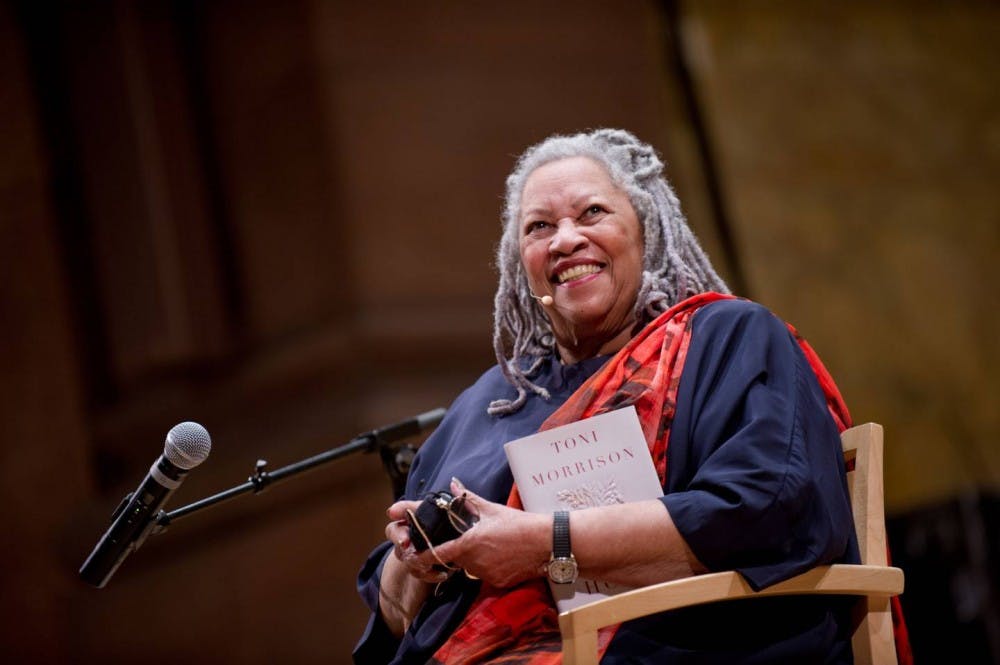Toni Morrison, Robert F. Goheen Professor in the Humanities, Emerita, renowned author, and Nobel laureate, died on the evening of Aug. 5, 2019. She was 88 years old.
“It is with profound sadness we share that, following a short illness, our adored mother and grandmother, Toni Morrison, passed away peacefully last night surrounded by family and friends,” the Morrison family wrote in a statement released by her publisher.
“She was an extremely devoted mother, grandmother, and aunt who reveled in being with her family and friends. The consummate writer who treasured the written word, whether her own, her students or others, she read voraciously and was most at home when writing. Although her passing represents a tremendous loss, we are grateful she had a long, well lived life.”
Morrison was the author of 11 novels, including “Song of Solomon,” which won the National Book Critics Circle Award in 1977, and “Beloved,” which won the Pulitzer Prize in 1988. She became the first African American to be awarded the Nobel Prize in Literature in 1993.
Her fiction told stories of African-American history, life, and culture in a way that blended personal journeys with the toils of centuries past. She combined magical, dreamlike scenes with real, vivid emotion to create her own form of myth, often exploring black female identity and black communities. The Swedish Academy cited her “novels characterized by visionary force and poetic import,” in which she “gives life to an essential aspect of American reality,” in awarding her the Nobel.
Morrison also authored several children’s books, essays, and works of nonfiction, including “Playing in the Dark: Whiteness and the Literary Imagination,” a critical volume in the field of whiteness studies.
Morrison joined the University faculty in 1989 and taught courses in creative writing and African American studies until 2006, when she transferred to emeritus status. She played a key role in attracting and supporting faculty and students from underrepresented backgrounds, and was also interested in interdisciplinary collaborations, founding the Princeton Atelier in 1994.
“Morrison was a writer who was not simply interested in writing. She was interested in collaborative ventures, be it writers working with musicians or writers working with dancers,” Howard G.B. Clark ’21 University Professor of the Humanities and current Director of the Princeton Atelier Paul Muldoon, who served alongside Morrison as co-director of the Atelier program from 2004 to 2006, wrote in an email to The Daily Princetonian.
Morrison wanted students to feel empowered and encouraged to make impactful work.
“I think it was very important for Toni Morrison that students feel they’re involved in ‘real’ artistic projects,“ Muldoon wrote. “She felt that students were no less likely than ‘professionals’ to make art of consequence.”
Toni Morrison was born Chloe A. Wofford on Feb. 18, 1931, in Lorain, Ohio, a small town west of Cleveland. Her father George Wofford was a shipyard welder, and she grew up listening to the stories her family told — including those about her grandparents, who left the South for the North as part of the Great Migration.
Morrison attended Howard University in Washington, D.C. (where she acquired the nickname “Toni” from her baptismal saint, Anthony), graduating with a B.S. in English in 1953. She then went on to earn her Master’s in American literature at Cornell University in 1955 and taught English at Texas Southern University before joining the faculty at Howard. There, she attended a fiction workshop and brought along samples of a story about a black girl who desperately wanted blue eyes — the basis for her first novel, “The Bluest Eye,” published in 1970.

For more than two decades, Morrison worked for Random House publishing, first as a textbook editor and later as senior editor in trade books. In the late 1960s and 70s, she edited the work of black writers like Angela Davis, Gayl Jones, and Muhammad Ali, supporting the type of literary efforts that had long been ignored by a white-dominated industry.
“I made it my business to collect African Americans who were vocal, either politically, or just writing wonderful fiction,” she once said.
One of her editorial projects was “The Black Book,” a nonfiction compilation of African-American history spanning three centuries. While searching for material, she came across an article about Margaret Garner, a fugitive slave after the Civil War. Discovered by a slave catcher, Garner chose to kill her two-year-old daughter rather than have her face a life of bondage. This became the inspiration for “Beloved, widely considered her masterwork and later made into a 1998 feature starring Oprah Winfrey.
Morrison served as the 2005 Baccalaureate speaker and was a central figure at the 2017 Princeton and Slavery Symposium. She was awarded an honorary doctoral degree from the University in 2013, and her papers are part of the library’s permanent collection. In 2017, West Hall was dedicated as Morrison Hall in honor of her contributions. Even after the Nobel brought her greater recognition, Morrison remained committed to her students and to teaching.
“On the day she won the Nobel Prize she could easily have skipped her class and met the world’s media,” Muldoon wrote. “She didn’t. She met her class.”
Morrison’s other accolades include the National Humanities Medal in 2000, the Presidential Medal of Freedom in 2012, and a gold medal from the American Academy of Arts and Letters in May of this year. The Toni Morrison Society, dedicated to the study and celebration of Morrison’s life and work, was founded in 1993. Morrison is survived by her son, Harold Ford Morrison, and three grandchildren.









